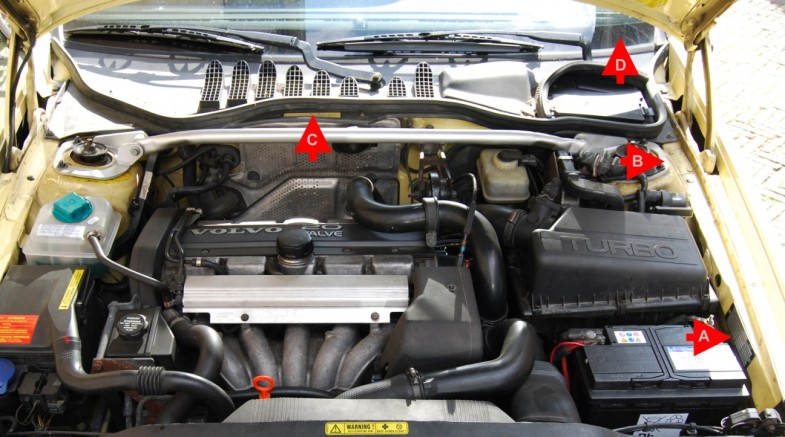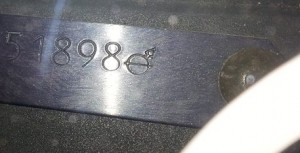In the motor compartment of a Volvo 850 T-5R there are four locations holding information about your car.
A. The Product plate / VIN plate
B. The body code plate
C. The VIN (punched into the body)
D. Plate with VIN riveted onto the top of the dashboard (USA and Canada only)

A. The Product plate.

1: Approval code.
Each country has its own rules concerning approval of the car in their territory. This approval is determined by at least active- and passive safety, emissions and with environmental protection. Since 1998 the WVTA (Whole Vehicle Type Approval) is organized the same way in Europe. The USA/Canada and Australia have their own rules and code. Since the approval for the T-5R was determined in 1994 most of the European countries still had their own approval codes.
– For S there is no approvalcode for the Estate

– For GB there is 0570705V for the Sedan

– For NL it is 94-4178 for the Sedan and 94-4181 for the Estate


– For D it is … for the Sedan and ABE NR G306 or B-2102 for the Estate


– For I it is DGM 5253276 OM for the Sedan and DGM 53276 OM for the Estate

– For AU it is BUILT DATE JUL 94 (for example) for the Sedan

In Australia there is also a special plate mounted next to the product plate with a standard text and the VIN again. Every car in Australia seems to have this plate.

2: VIN (Vehicle Identification Number)
– a: Brand
YV1 = Volvo (Y = Sweden, V1 = Volvo)
– b: Production platform
L = P80
(850, S70, V70(XC) classic, C70 classic Coupe & Convertible)
– c: Model
S = Sedan
W= Wagon
– d: Engine code
58 = 2,3 liter B5234T5
47 = 2.0 liter B5204T (only for the Italian market)
– e: Emission code
0 or 1
The first T-5R’s had emission code 1.
The main batch of cars, produced after week 40 of 1994, had emission code 0.
(Significance unknown).
– f: (USA/Canada:) Control digit
In the USA and Canada VIN’s are build according to a slight other standard compared to other countries. Position f holds a control digit build from the other codes in the VIN. Her is how this digit is calculated. Each symbol from the VIN is decoded to a figure. (f.e. C will be 3). Each symbol from the VIN also has a multiplication factor. Each decoded figure is multiplied with the corresponding factor resulting is a product for each VIN symbol. The products are added and the sum is divide by 11. The rest of the division is the control value.

How to determine the value of the control digit
the sum of the products in this example is 337. So 337 / 11 = 30 rest 7
– f: (elsewhere:) Gearbox
2 = M56 Manual gearbox
6 = AW50-42 Automatic gearbox


Decalls attached to both gearboxes
– g: Model year
S = 1995
T = 1996
0 = France
– h: Factory code
2 = Gent, Belgium
– i: Chassis number
6 figures in the following ranges:
MY 1995:
Sedan: 175000 – 267000
Wagon: 078000 – 171000
MY 1996:
Sedan: 267000 – 355000
Wagon: 171000 – 275000
3: Maximum weight including load
Estate: 1970 kg
Sedan: 1930 kg
4: Maximum weight including load and trailer
Estate: 3570 kg
Sedan: 3530 kg
The early cars had no value here (obviously the T-5R wasn’t supposed to be a towing car)
5: Maximum load on front axle
Estate: 1040 kg
Sedan: 1040 kg
6: Maximum load on rear axle
Estate: 1010 kg
Sedan: 900 kg
7: Market code
| Amount of Volvo 850 T-5R’s | Engine types | |||
| Market code | Market name | Delivered in | 47 | 58 |
| 10 | Sweden | Baltic States | 10 | |
| Denmark | 40 | |||
| Netherlands | 1 | |||
| Norway | 15 | |||
| Russia | 3 | |||
| Sweden | 321 | |||
| US Special Sales | 3 | |||
| VCC Design | 30 | |||
| VCI System | 57 | |||
| 13 | Finland | Finland | 77 | |
| 15 | Great Brittain | BeNeLux | 1 | |
| UK United Kingdom | 440 | |||
| VCI System | 103 | |||
| 18 | Germany | Austria | 81 | |
| Bulgaria | 6 | |||
| Czech rep | 6 | |||
| Germany | 1433 | |||
| Spain | 185 | |||
| Switzerland | 180 | |||
| VCC Design | 11 | |||
| VCI System | 49 | |||
| 20 | Belgium | BeNeLux | 485 | |
| Poland | 1 | |||
| 22 | France | France | 92 | |
| 24 | Italy | Greece | 1 | |
| Italy | 914 | |||
| BeNeLux | 1 | |||
| Portugal | 16 | |||
| 31 | California | BeNeLux | 1 | |
| Puerto Rico | 1 | |||
| US Midwest | 246 | |||
| US Northern | 167 | |||
| US Southern | 186 | |||
| US Special Sales | 33 | |||
| US Western | 337 | |||
| VCC Design | 3 | |||
| VCI System | 134 | |||
| 39 | Canada | Canada | 103 | |
| 40 | Singapore | Brunei | 7 | |
| Singapore | 25 | |||
| 41 | Korea | Korea | 7 | |
| 43 | Saudi Arabia | Kuwait | 5 | |
| Pan Arabic | 60 | |||
| Qatar | 7 | |||
| Saudi Arabia | 141 | |||
| UAE | 34 | |||
| 44 | Hong Kong | Brunei | 2 | |
| Hong Kong | 30 | |||
| Thailand | 10 | |||
| 45 | Taiwan | Taiwan | 54 | |
| VCC Design | 1 | |||
| 46 | Australia | Australia | 43 | |
| New Zealand | 3 | |||
| 47 | South Africa | VCI System | 17 | |
| 50 | Japan | Japan | 749 | |
| VCC Design | 2 | |||
| VCC PTO+TO VEC | 1 | |||
| Total | 914 | 6057 | ||
| Source: Volvo | ||||
8: Upholstery code / Interior code
For the T-5R it is always: 3871
3 – Specific for the 850
8 – Leader/Alcantara
7 – Gray and Dark Gray
1 – for all T-5R’s it is 1.
9: Colour code
The code contains the code for the colour, the code for the paint manufacturer and the code for the type of paint.
Production colourcodes for the T-5R are:
607-11, 019-11, 421-41
607 = Cream Yellow
019 = Stone Black
421 = Dark Olive Pearl
11 = produced by BASF/Glasurit and the paint is Solvent based.
41 = produced by IDAC/Dupont and the paint is Solvent based.
10: Special vehicle code
The three grey T-5R’s have a special vehicle code 08447. This must be related to the non-standard colour.
11: Chassis codes
Source: Parts Catalog 850-series ed. 9-1997 – Group 72

-j: Spring front / Shock absorber front
S2 = Manual Gearbox ?
S3 = Automatic Gearbox ?
-k: Anti-roll bar, front
Y = -21 mm
-l: Shock absorber, rear
H = 271904-5
E = 271832-8
-m: Spring, rear
A = standard 4 doors
G = 4 doors
J = 4 doors
K = 5 doors
-n: Anti-roll bar, rear
20.8 mm Nivomat lower chassis
N = 9191462-2
P = 9191461-4
-o: Bump rubber (front/rear) Combination auxiliary spring, front
S = Not Lowered
L = Lowered

Example product plate. Cream Yellow 850 T-5R Sedan, originally delivered in the Netherlands.
B: Body code

Example of the plate with the body code from a CY Sedan
In the Gent factory there are three product areas. Gent A for body assembly where the colorless body is produced. Gent B where the body is painted and Gent C where the car is assembled.
During the Gent A process the body gets a body number. It is a plate attached with two screws near the left front strut holding an unique body number. In the Gent B process this number will be painted too. The body number is there to follow the specific body during the process and to build it according the specifications.
When the body enters the Gent C process it gets its final identification with the product plate. Source: Tom, former employee from the Gent plant.
C. The VIN, puched in the body.

Example of the punched VIN into the body of a CY Sedan
D. Plate with VIN riveted onto the top of the dashboard (USA and Canada only)

Thanks to:
Several resources on the internet and:
(AU)
Mick, CY Sedan (46)
(B)
Tom, Volvo
(EST)
VLR7
(FI)
Teemu, Grey Sedan (43)
(GB)
Alan, CY Sedan (15)
(N)
Tom, CY Sedan ( )
(NL)
Sander, CY Estate (18)
Vincent, DOP Estate (20)
Maurice, DOP Sedan (20)
Jan, CY Estate (18)
Jan, CY Sedan (20)
Jeffrey, CY Estate (18)
Dennis, CY Estate (10)
Rens, Sedan (24)
Mark, CY Estate
(S)
Hans, Volvo
USA
Nick, CY Sedan ( )
Please mail me an image of your VIN-plate (and other plates if any) if the information adds something new to the information above (data from a lot of countries is still missing). You can blur the last three digits of your VIN if you like. That’s the way to keep your car anonimous. I will not publish anything trackable without your permission.
If you can fill in the blanks, your information is very welcome too !!

47 = 2.0 liter B5234T (only for the Italian market)
Should be B5204T
(webmaster: Thanks for this update!)
According to Volvo 850 Maintenance manual: https://www.volvoclub.org.uk/tech/service/850/MaintenanceInfo.pdf:
8 – Emission Control System
0 * Three-way Converter, Heated Oxygen Sensor, W/O EGR
1 * Three-way Converter, Heated Oxygen Sensor, W/EGR
2 * Three-way Converter, Heated Oxygen Sensor, W/EGR, Airpump